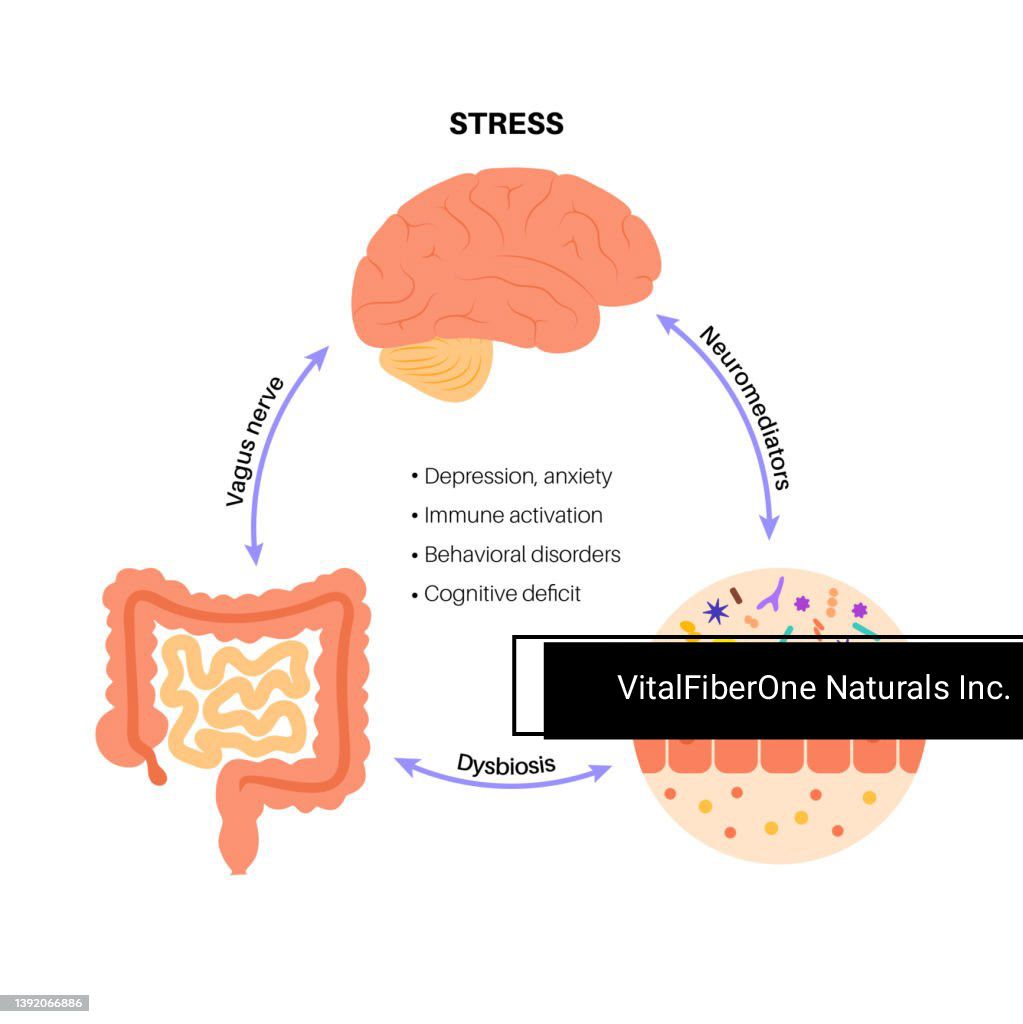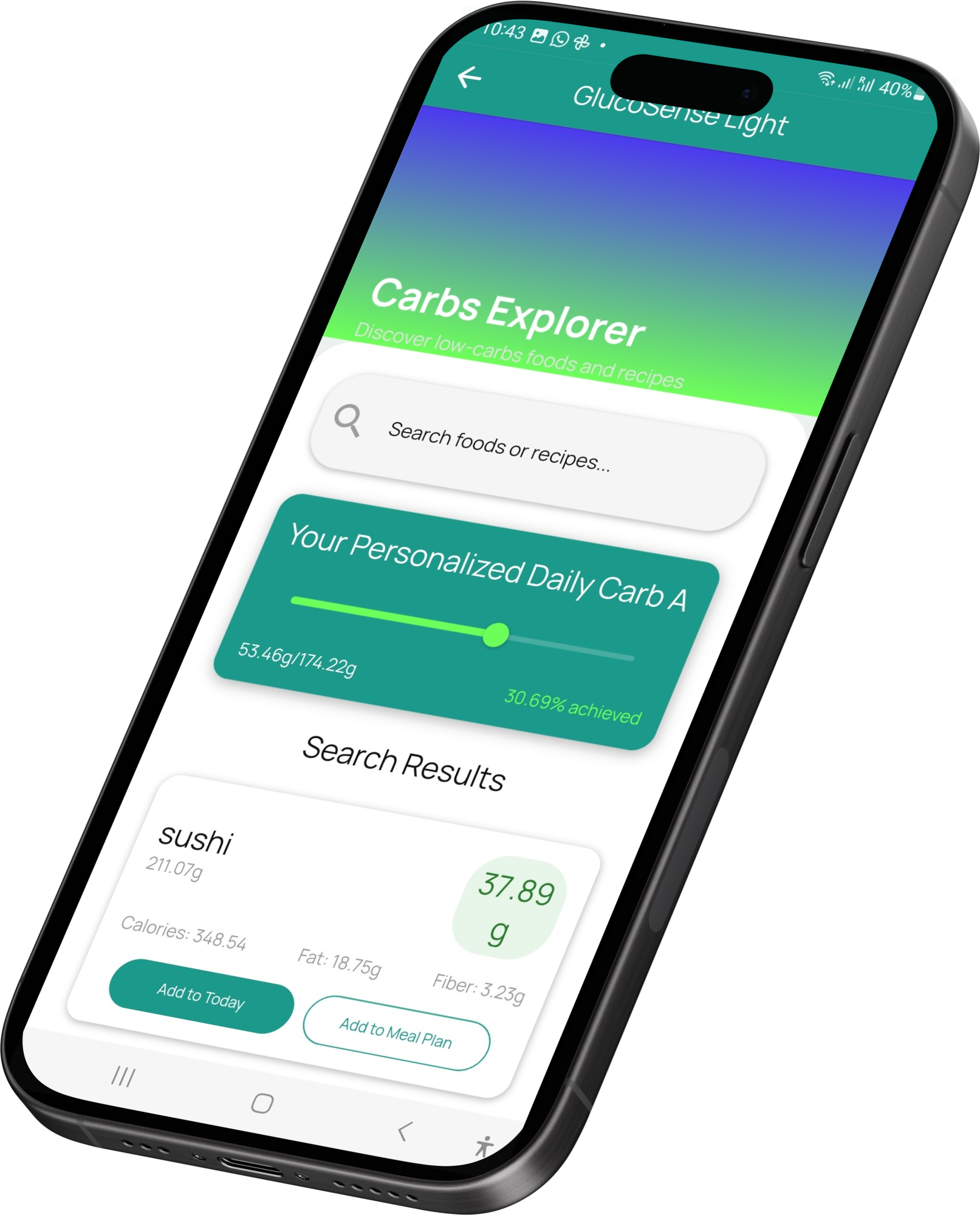Blog-Layout
The Mind-Gut Connection: How Your Gut Health Influences Mental Well-being
VitalFiberOne Naturals Inc. • April 8, 2024
The Mind-Gut Connection: How Your Gut Health Influences Mental Well-being?

In recent years, there's been a burgeoning interest in the complex relationship between the gut and the brain, often referred to as the mind-gut connection. This bidirectional communication system not only plays a crucial role in digestive health but also exerts a profound influence on mental well-being. As an authoritative voice in wellness education, let's delineate how gut health can shape your mental landscape.
Understanding the Gut-Brain Axis
The gut-brain axis refers to the biochemical signaling that takes place between the gastrointestinal tract and the central nervous system. This includes not only the direct neural communication via the vagus nerve but also the intricate interplay involving hormones, immune molecules, and microbial metabolites. The microbiome—the vast community of microbes residing in our gut—emerges as a key player in this dialogue.
The Microbiome and Its Role in Mental Health
Each individual hosts a unique microbiota, which performs essential functions like digesting certain types of fiber, synthesizing vitamins, and warding off harmful bacteria. Research has revealed that certain strains of gut bacteria are influential in producing neurotransmitters such as serotonin and dopamine, which are critical for mood regulation.
Disruption in the microbiome has been linked to a plethora of mental health conditions, ranging from anxiety and depression to neurodevelopmental disorders like autism. This suggests that a balanced microbiome is fundamental for maintaining mental well-being.
Dietary Influence on the Gut-Brain Connection
What you eat can dramatically affect your microbiome's composition and, subsequently, your mental health. Diets high in processed foods, sugar, and saturated fats can lead to dysbiosis—a microbial imbalance detrimental to your gut and brain health. On the flip side, a diet rich in diverse fibers, vegetables, fruits, and fermented foods promotes a thriving gut flora that supports mental wellness.
Probiotics, Prebiotics, and Mental Health
Probiotics are live beneficial bacteria, while prebiotics are dietary fibers that feed those bacteria. Including both in your diet can boost your gut microbiome's health and diversity. There's evidence suggesting that certain probiotics—sometimes referred to as "psychobiotics"—have the potential to alleviate symptoms of depression and anxiety.
Probiotic-rich foods include yogurt, kefir, sauerkraut, and kombucha, while prebiotic sources feature garlic, onions, bananas, and asparagus. Integrating these into your daily diet can bolster your gut flora and, in turn, enhance your mental health.
Stress and The Gut-Brain Connection
Chronic stress is an enemy of gut health. Stress can alter your gut bacteria and increase intestinal permeability, often referred to as "leaky gut," leading to low-grade inflammation. This inflammation is a common denominator in many mental health issues. Learning to manage stress with mindfulness, meditation, or regular physical activity can thus be crucial in maintaining a healthy mind-gut relationship.
Future Directions in Mind-Gut Research
The realm of gut-brain research is expanding, focusing on personalized interventions to modulate the microbiome for mental health benefits. Though still in its infancy, the field promises a future where probiotic therapies could be tailored to treat specific psychiatric conditions.
Takeaway Tips for Optimizing Your Gut-Brain Health
To nurture your mind through your gut, consider these simple strategies:
1. **Diversify Your Diet**: A varied diet rich in whole foods provides the nutrients to support a healthy microbiome.
2. **Incorporate Fermented Foods**: These are natural sources of probiotics that can enhance microbial diversity.
3. **Choose High-Quality Prebiotics**: Aim for a range of fiber sources to feed beneficial gut bacteria.
4. **Stay Hydrated**: Adequate water intake helps maintain the mucosal lining of the gut.
5. **Limit Antibiotics**: Use antibiotics only when necessary, as they can disrupt the balance of your gut microbiome.
By embracing the connection between your gut and your mental health, you can take meaningful steps toward holistic well-being. It's not just about what you eat; it's about caring for the trillions of microscopic companions that profoundly influence your moods, thoughts, and overall health.
Prepare to harness the power of your gut to elevate your mental well-being and step into a life of enriched wellness.
Gut Microbiota and Sleep
Quality sleep is another cornerstone of mental well-being influenced by our gut health. Emerging studies suggest that the gut microbiome might affect sleep patterns through the production of neurotransmitters and the regulation of hormones like melatonin. To promote restorative sleep, consider a diet that supports your gut flora and avoid foods that may cause digestive discomfort, especially close to bedtime.
Your Way to a Healthy Gut
Regular physical activity has been shown to increase the diversity of your gut microbiome. Exercise encourages the growth of beneficial bacterial species that can improve barrier function, reduce inflammation, and promote neurotransmitter balance, all contributing to better mental health.
Mindfulness: Connecting with Your Gut
Mindfulness practices not only reduce stress but also can enhance your awareness of the gut feelings that reflect the state of your digestive system. Paying attention to these subtle cues can guide you toward a diet and lifestyle that keep both your mind and gut content.
Clinical Implications and Mental Health Therapies
The new frontier in treating mental health disorders involves looking at the gut. While further research is needed, current evidence supports the concept that probiotics and dietary adjustments can become adjunct therapies to conventional mental health treatments.
The terrain of gut health and its impact on mental well-being is a promising field, burgeoning with potential. It highlights the fact that our bodies are ecosystems that must be balanced and cared for holistically. By fostering a symbiotic relationship with our gut microbiota, we are not just feeding a series of organs; we are nurturing our mental and emotional selves.
Embracing the mind-gut connection offers an empowering perspective: many aspects of our mental health are not solely in our heads—they are also in our guts. And as we move forward, nurturing that connection might just be the key to unlocking a brighter, healthier future.
Refresh your approach to mental wellness today by aligning your gut health strategies with your mental health goals – and experience the transformative impact of living in harmonious gut-brain synergy.
Personalizing Your Gut-Health Plan
Every person's microbiome is as unique as their fingerprint, which means that personalization is key to an effective gut-health strategy. By considering factors such as genetics, lifestyle, and current health status, you can tailor your approach to gut health in ways that positively affect your mental well-being.
The Role of Genetics in the Mind-Gut Connection
Genetics can influence the variety and abundance of bacterial species in your gut, which means that some people might be more predisposed to gut-brain axis related issues. Personalized probiotic and prebiotic recommendations, based on genetic markers and gut microbiota composition, may become central to preventative health strategies.
The Importance of Patient Education
Understanding the mechanisms behind the mind-gut connection empowers people to make informed choices about their health. Patient education initiatives that provide clear, actionable advice should be a priority—equipping individuals with the knowledge to take control of their gut-brain axis can have profound implications for public health overall.
Reaching Beyond Diet: Lifestyle Factors Affecting Gut Health
While diet forms the foundation of gut health, other lifestyle factors can significantly influence the gut-brain connection. Sleep, exercise, and stress-management techniques all play critical roles. Encouraging a comprehensive lifestyle approach to gut health can bolster mental wellness strategies, creating a feedback loop of improved overall health.
As we continue to peel back the layers of the mind-gut connection, it becomes increasingly clear that an integrated approach to health is necessary. By acknowledging and addressing the intertwined nature of our mental and gastrointestinal health, we can open up new avenues for treatment and improved quality of life.
The importance of the mind-gut connection cannot be overstated, and it is time for both individuals and healthcare professionals to recognize the power of this relationship. By combining a balanced diet with active and mindful living, managing stress, and seeking personalized advice when needed, we can all harness the gut-brain axis to foster better mental health and overall well-being.
With this in-depth exploration of the mind-gut connection, our blog invites readers to commence on a journey of self-discovery and healing from the inside out. Join us in nurturing a conversation around mental wellness that transcends traditional boundaries, advocating for a future where the symbiosis of our physical and mental health is universally acknowledged and celebrated.
Lifelong Learning about the Mind-Gut Connection
The journey toward understanding the mind-gut connection doesn't stop here. Science is always advancing, and with each study, we gain a deeper knowledge of how our body’s systems are interconnected. Stay curious, stay informed, and consider engaging with communities of like-minded individuals who prioritize gut health as a pathway to mental wellness.
Inviting Expert Collaboration
Collaboration between nutritionists, gastroenterologists, psychologists, and neuroscientists is critical to expanding our grasp of the mind-gut connection. By sharing insights and combining expertise, the medical community can facilitate a more nuanced understanding and deliver comprehensive care that addresses both gut health and mental health.
Encouraging a Proactive Stance Towards Health
Taking a proactive stance is essential. Regular check-ups with healthcare providers, staying updated with the latest research, and implementing preventive measures can lead to early identification and management of imbalances in the gut microbiome before they impact mental well-being.
The Future of Mental Health is Holistic
The days of viewing mental health in isolation are behind us. The future is holistic, focusing on the interconnectedness of the body’s systems. By embracing the complexity of the mind-gut connection, we’re paving the way for integrative health solutions that are both effective and empowering.
Embracing a Gut-Positive Lifestyle
Understanding and taking care of your gut health is not a trend but a fundamental aspect of embracing a healthier, emotionally balanced life. By fostering a positive relationship with your gut, you give yourself the best chance of achieving optimal mental well-being.
Remember, the dialogue between your gut and brain is ongoing. Listen to it, nurture it, and let it guide you toward a more harmonious existence. It’s not merely about warding off illness—it's about thriving mentally, physically, and emotionally.
By aligning the call to action with the reader's desire for a balanced life, we hope to inspire a shift towards comprehensive health practices. Keep exploring, keep learning, and join us on a path where every meal, every thought, and every breath moves you closer to a state of complete well-being.
Recap: Key Takeaways from the Mind-Gut Connection
- **Bidirectional Communication**: The gut-brain axis represents a two-way conversation between your digestive system and mental state.
- **Micronutrients and Mood**: The foods you eat can significantly affect both your gut microbiota and your mood.
- **Probiotics and Mental Health**: 'Psychobiotics' may hold the key to managing and potentially alleviating symptoms of mental health conditions.
- **Lifestyle Matters**: Sleep, exercise, and stress all influence your gut health, which in turn, affects your brain.
- **Personalize Your Plan**: Use a tailored strategy to address your unique gut health needs for a stronger mental health outcome.
Looking Ahead: What's Next on Your Gut Health Journey?
- **Continuous Education**: Stay informed about new research and evolving recommendations for gut health.
- **Community Engagement**: Dialogue with a community of health-conscious individuals can motivate and educate you along your journey.
- **Integrated Health Approach**: Consider holistic health options that include the care of your gut as part of your general well-being.
- **Innovation in Medicine**: Look out for new treatments that may emerge from the growing understanding of the mind-gut connection.
Putting It into Practice: Making the Mind-Gut Connection Work for You
Armed with this information, it's time to put your knowledge into action:
1. **Start with Your Plate**: Begin incorporating a wider variety of gut-friendly foods into your daily meals.
2. **Mindfulness and Exercise**: Develop mindfulness practices and regular exercise routines that support your gut and mental health.
3. **Health Assessments**: Talk to your healthcare provider about assessments that can help you understand your gut health better.
4. **Journal Your Journey**: Keep a record of how changes in your diet and lifestyle affect your mental well-being.
Your Pathway to Harmonious Health
The mind-gut connection opens up a fascinating pathway to better health that recognizes our body as an integrated whole. Embarking on this journey isn't just about preventing or treating issues—it's about embracing a more connected way of living that celebrates the interdependencies of our internal systems. As you adjust your diet, refine your lifestyle, and attune to the needs of your gut, you'll likely discover a greater sense of balance, clarity, and happiness in your daily life.
Nurturing Your Second Brain: Engage with Your Enteric Nervous System
It's sometimes called our "second brain," and for a good reason. Your enteric nervous system resides in your gut and has a profound impact on emotions and moods. Engage with this aspect of your physiology by recognizing the signals your gut sends you. When you're nervous, do you feel it in your stomach? Do your gut reactions align with the emotions you're experiencing? By paying attention to these signals and responding appropriately—whether with dietary changes, stress management, or medical intervention—you harness the power of your second brain.
Community and Support: Share Your Gut Health Journey
You're not alone on this journey. Engaging with others interested in gut health can provide support, share experiences, and exchange tips. Consider joining online forums, attending local workshops, or simply starting conversations with friends and family about the importance of gut health. Not only are you likely to learn something new, but these social interactions can themselves promote gut health by reducing stress and fostering a sense of community.
Embrace Experimentation: Find What Works for You
Biology is not uniform, and what works for one person may not work for another. It's essential to experiment and find what dietary choices, supplements, and lifestyle adjustments best suit your individuality. Remember, small changes over time can lead to significant benefits, so start small and be consistent. It's this experimentation and personalization that will help you cultivate a gut environment that supports mental wellness.
Commit to Continual Learning
This field is rich with ongoing research, and staying informed is key to optimizing your health. Subscribe to health newsletters, follow leading experts on social media, or participate in webinars and health talks. Your dedication to learning will pay dividends in terms of your physical and mental well-being.
As you close this chapter of our exploration into the mind-gut connection, remember that every step you take towards better gut health is a step towards a happier, more fulfilled you. The journey is ongoing, the science is evolving, and the potential for improved health and increased joy is immense.
Thank you for joining us on this enlightening path. May you find balance in your gut, peace in your mind, and contentment in every moment. Here’s to a vibrant, gut-nourished life, full of discovery and wellbeing.
Embracing the Journey with Confidence
Now that you have the roadmap to strengthen the mind-gut connection, embark on this journey with confidence. Start by reflecting on your current state of health, establish a baseline, and set attainable goals. Remember, every positive change, no matter how small, is a step forward in this journey.
Building a Supportive Environment
The environment around you can significantly influence your success. Create a living space that encourages healthful eating, such as a kitchen stocked with probiotic and prebiotic-rich foods. Cultivate habits that reduce stress in your life, which in turn can positively affect your gut flora, like engaging in regular outdoor activities or setting up a relaxing home environment.
Integrating Mind-Gut Health into Your Routine
Consider making gut health a part of your daily routine. Routine could include a morning probiotic alongside breakfast, a daily walk to reduce stress and boost your gut health, and mindfulness exercises before bed to settle both your mind and digestive system.
Monitoring and Modifying Your Strategy
Tracking your progress is essential. Use a journal to note changes in your mood and digestive health as you modify your diet and lifestyle. Be mindful and adapt your approach based on what you observe. It's a process of learning and adaptation that is as individual as you are. If necessary, don’t hesitate to seek advice from healthcare professionals who understand the intricacies of the gut-brain connection.
Affirming the Commitment to Yourself
Remember, this is a commitment to your holistic well-being. Acknowledge your effort, celebrate your successes, and be kind to yourself through the challenges. Self-compassion is a crucial ingredient in any health endeavor, especially when navigating the complex territory of mental and gut health.
Looking to The Horizon
The exploration of the mind-gut connection is a dynamic and evolving area of health and science. Its potential is as vast as the microbiome itself. As you continue to learn and grow, keep an eye on new discoveries and insights that can guide your choices and enhance your quality of life.
Conclusion: Forward with Gut Health
Untangling the web of gut health and mental wellness is an exciting, ongoing discovery. Embrace this holistic approach to health, and let your mind and gut guide you to new heights of well-being. Go forward with the knowledge that caring for your gut is a profound form of self-care that can elevate your mental health, your immunity, and your overall quality of life. The mind-gut connection isn't just about dietary choices—it's a comprehensive lifestyle approach that acknowledges the complexity of our bodily systems.
Creating a Sustainable Practice
As with any health journey, the key to success is sustainability. Incorporating gut-friendly practices into your life should be enjoyable and rewarding, not burdensome. Choose activities and foods that you genuinely enjoy to ensure that maintaining your gut health is a pleasure, not a chore. Whether it's savoring a delicious prebiotic-rich meal or taking joy in a yoga class that eases your stress, find the joy in every action that contributes to your health.
The Power of Knowledge
Equip yourself with knowledge, for it is a tool that empowers you to make informed decisions about your health. Continue reading reputable studies, listening to expert podcasts, and maybe even attending seminars on gut health. With a deeper understanding of the science behind the mind-gut connection, you become more adept at making choices that fit your individual needs.
Advocacy and Sharing Your Story
As you witness the positive changes in your own life, consider becoming an advocate for gut health. Share your story with others, contribute to community discussions, and help spread the word about the importance of the gut-brain axis. Your journey could inspire others to embark on their own, creating a ripple effect that boosts the well-being of your community.
Final Thoughts
Your body is an incredible system, with the mind and gut in constant conversation, often dictating how you feel both emotionally and physically. Tuning into this conversation could be the most profound step you ever take for your health. It's a dialogue worth listening to, one that speaks volumes about your well-being, and can ultimately lead to a more vibrant, health-filled life.
Thank you for joining us on this dive into the depths of the mind-gut connection. Continue to nurture this relationship, and chart a course toward a future where your mental and physical health are in symbiotic harmony.

By VitalFiberOne Naturals Inc.
•
February 8, 2025
Revolutionize your diabetes care with the power of AI! Introducing GlucoAI Precision Technology, a game-changing innovation that's transforming the way we manage diabetes. This cutting-edge technology uses artificial intelligence to provide personalized insights and precise glucose monitoring, empowering individuals to take control of their health. Say goodbye to guesswork and hello to data-driven decision making. Learn how GlucoAI is revolutionizing diabetes care and improving lives.

By VitalFiberOne Naturals Inc.
•
January 24, 2025
Making grocery shopping a breeze for diabetics! GlucoSense is revolutionizing the way people with diabetes shop for groceries. With its innovative technology, GlucoSense makes it easy to identify and purchase diabetes-friendly food products. Say goodbye to hours of research and label-reading, and hello to a stress-free shopping experience. In this video, we'll show you how GlucoSense is changing the game for diabetics and making healthy grocery shopping a whole lot easier. Whether you're living with diabetes or know someone who is, this video is a must-watch!

By VitalFiberOne Naturals Inc.
•
December 20, 2024
Are you tired of feeling uncertain about your diabetes management? Do you have burning health questions that need answers? In this blog, our panel of diabetes experts are here to provide you with the clarity and confidence you need to take control of your health. From understanding blood sugar levels to managing medications and diet, our experts will cover it all. Get ready to have your most pressing questions answered and start living your best life with diabetes. Whether you're newly diagnosed or have been living with diabetes for years, this video is for you. So sit back, relax, and let's dive into the world of diabetes management together!

By VitalFiberOne Naturals
•
December 18, 2024
Indulge in the flavors of the Middle East with our Fiber Rich Baked Falafel recipe, served with a side of creamy Tahini Sauce! In this video, we'll show you how to make crispy on the outside, fluffy on the inside falafel using chickpeas, herbs, and spices, all while keeping it healthy and fiber-rich. The perfect vegetarian snack or meal option. Our tahini sauce recipe is a game-changer, made with tahini paste, garlic, lemon juice, and olive oil. It's creamy, tangy, and pairs perfectly with our baked falafel. Get ready to elevate your snack game with this easy-to-make and delicious recipe!

By VitalFiberOne Naturals Inc.
•
November 17, 2024
Unlock the secret to a healthier and fitter you with Fiber-Guru's 4 weeks FREE trial! In this blog, we'll introduce you to a revolutionary program designed to help you achieve your fitness goals and transform your body in just a few weeks. With Fiber-Guru, you'll get access to a comprehensive fitness plan, personalized coaching, and a supportive community to help you stay motivated and accountable. Say goodbye to fad diets and hello to a sustainable lifestyle that will leave you feeling energized, confident, and empowered. Try Fiber-Guru today and start your fitness journey with a 4-week free trial!

By VitalFiberOne Naturals Inc.
•
August 26, 2024
Are you trying to lose weight and wondering about the best time to eat? In this video, we dive deep into the optimal meal timing for weight loss. Should you prioritize a smaller breakfast, a moderate lunch, or a light dinner? We explore the science behind meal timing and its impact on your metabolism, hunger levels, and overall weight loss journey. Discover the pros and cons of each meal and learn how to structure your eating schedule for maximum results. Whether you're a breakfast lover or a dinner devotee, this video provides valuable insights to help you make informed choices. Don't miss out on tips and strategies that can transform your eating habits and support your weight loss goals! Tune in and find out the best time to eat for effective and sustainable weight loss. Remember to like, comment, and subscribe for more health and wellness tips!






